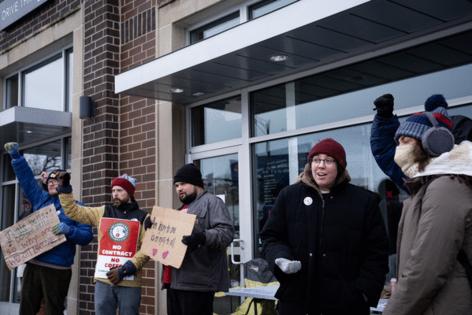Starbucks baristas go on strike in several Chicago, Seattle, Los Angeles stores
Published in Business News
Starbucks baristas went on strike at several stores in Chicago, Seattle and Los Angeles on Friday, with their union warning the walkouts could spread to hundreds of cafes by Christmas Eve if the coffee giant does not meet workers’ demands at the bargaining table.
In Chicago, baristas at the company’s store at 5964 N. Ridge Ave. in Edgewater, one of the first in the city to unionize more than two years ago, were on strike Friday morning. Also on strike were baristas at 2101 W. Armitage Ave. in Bucktown and at 4553-4557 N. Lincoln Ave. in Lincoln Square, local organizers said. Outside the city, baristas at one cafe each in Evanston and Des Plaines were on strike.
The union said the company had offered baristas an economic package that included no immediate new wage increases for union baristas and a guarantee of only 1.5% in future years.
“The company has repeatedly pledged publicly that it intended to reach contracts by the end of the year, but it has yet to present workers with a serious economic proposal,” Starbucks Workers United said in a news release Thursday evening.
In a statement, Starbucks spokesperson Jay Go-Guasch accused union bargainers of “prematurely” ending bargaining sessions earlier in the week.
“We are ready to continue negotiations to reach agreements,” Go-Guasch said. “We need the union to return to the table.”
The strikes this week come three years after baristas won their first election at a cafe in Buffalo, New York, and more than two years since the Starbucks union push came to Chicago, where baristas first voted to unionize in May 2022. Starbucks Workers United said it now represents more than 11,000 workers in more than 535 cafes nationwide across 45 states and Washington, D.C.
The union accused the company of backtracking on a February agreement to come together on a “foundational framework” to finalize a first contract and resolve legal issues between the union and company. Prior to the February agreement, union baristas had long accused the company — which has faced a litany of allegations of labor law violations from organizers and federal labor officials throughout the union campaign, including in Chicago — of stonewalling negotiations.
Starbucks said Friday morning that the “overwhelming majority” of its more than 10,000 company-owned U.S. stores remained open and were serving customers as normal. The union said more than 10 stores were shut down.
“When you’re in a city like Chicago, $15, $20 an hour just does not cut it,” said Shep Searl, a longtime Starbucks barista and a member of the union’s bargaining team. Searl spoke from the picket line outside the Edgewater store on Friday. “We deserve a living wage, and we deserve what is a living wage in 2024, 2025, not what was a living wage in 2013.”
Starbucks said that the 1.5% raise guarantee was only a floor for future raises, not a ceiling. The company said its baristas make an average wage of more than $18 an hour, and that the union’s wage proposals would grow the minimum wage for hourly workers by 64% immediately and by 77% over the course of the three-year contract, which the company described as “not sustainable.”
In a statement, barista and bargaining delegate Michelle Eisen said the company’s characterization of the union’s wage proposals were “misleading and they know it.”
Go-Guasch said it was “disappointing” the union had not returned to the bargaining table given progress the two sides, which she said had met in more than nine bargaining sessions since April, had made already.
“We’ve reached over 30 meaningful agreements on hundreds of topics Workers United delegates told us were important to them, including many economic issues,” Go-Guasch said.
Teddy Hoffman, a barista bargaining delegate for the striking Edgewater store who was picketing Friday morning, said the company had previously offered annual raises of at least 1% before moving its offer to a minimum of 1.5%. Hoffman, who said he has worked at Starbucks for nine years, called the offer “blatantly disrespectful.”
“The company has met us halfway on a lot of the non-economic stuff,” Hoffman said. “So it makes it all the more clear with their response to our economic package that it’s not that they can’t, they just won’t.”
Starbucks baristas have struck intermittently in Chicago and elsewhere since the union push began. Over the last two years, workers have struck some union stores on the company’s annual Red Cup Day holiday promotion.
Hoffman said this year the union had called off Red Cup Day “practice pickets” — protests that take place when workers are not on strike — in a show of good faith to the company.
This year’s strikes come a day after the International Brotherhood of Teamsters launched a series of holiday-season strikes of Amazon delivery drivers nationwide, including in northwest suburban Skokie.
©2024 Chicago Tribune. Visit at chicagotribune.com. Distributed by Tribune Content Agency, LLC.












Comments